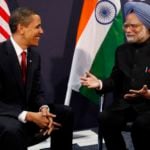 India is getting ready for U.S. President Barak Obama’s visit to the country beginning on November 4th. Apart from the political and diplomatic dimensions of the visit, the most interesting aspect is the Indian media’s pre-visit coverage. Editorials in leading news dailies and comments by strategic observers in the run up to President Obama’s visit have a different tone this time. Visits by U.S. Presidents are usually hyped as historic, path-breaking and momentous. However, caution seems to be the more dominant sentiment this time.
India is getting ready for U.S. President Barak Obama’s visit to the country beginning on November 4th. Apart from the political and diplomatic dimensions of the visit, the most interesting aspect is the Indian media’s pre-visit coverage. Editorials in leading news dailies and comments by strategic observers in the run up to President Obama’s visit have a different tone this time. Visits by U.S. Presidents are usually hyped as historic, path-breaking and momentous. However, caution seems to be the more dominant sentiment this time.
One thing that stands out especially in the electronic media is the emphasis on the President’s middle name Hussein. Several news items elaborating such innocuous things as the Presidents travel routes and meals refer to his middle name. Bruce Riedel’s article in Times of India mentions three U.S. Presidents in the opening paragraph – Jimmy Carter, Richard Nixon and Barak Hussein Obama. The use of ‘Hussein’ in this case is intended to influence readers in particular ways because a more balanced article should have used Richard Milhous Nixon and James Earl “Jimmy” Carter Jr.
Some Indian journalists have expressed concern over President Obama’s decision not to visit the Golden Temple. Barkha Dutt sees it President Obama’s diminishing support for multi-culturalism and bowing to the Republican pressure which might use President Obama’s image with is head covered to project his ‘Muslim Image’. She, however, fails to acknowledge the President’s visit to Mughal Emperor Humayun’s tomb.
Obama Administration’s decision of not clubbing India and Pakistan in first visit to the sub-continent has not significantly impressed the Government of India. According to C. Raja Mohan, “so long as US troops stay in Afghanistan, Washington’s dependence on the Pakistan army will remain the central feature of our strategic environment. Delhi is fully aware that the US partnership with India is premised on the convergence of long-term interests between the two countries in the Indian Ocean, Asia-Pacific and beyond. India also knows that the current intense US relationship with Pakistan is driven by near-term interests in Afghanistan.” President Obama’s acknowledgement of Pakistan as a source of regional instability and global terrorism will be more fruitful from India’s perspective rather than symbolic gestures.
Government officials and the business community are also working to keep down the expectations of grand agreements emerging from President Obama’s visit. Foreign Secretary Nirupama Rao has stated that no ‘big bang’ is expected during President Obama’s visit. Secretary Rao added, “We are not at a stage in our relationship for dramatic breakthroughs and big bang.” Government of India’s tough stand is reflected on the issue of nuclear liability bill, which has been criticized in the U.S. It is unlikely that India will comply with U.S. wishes on this count during President Obama’s visit.
President Obama’s delegation will emphasize on bilateral economic relations, but the Indian side has a long wish list and the stage seems set for tough bargaining rather than breakthrough agreements. Issues like hiking of H1-B and L1 visa fees for foreign companies; raising India’s partner status and category tier-listing on the National Disclosure Policy, the U.S. Munitions List, and the Commerce Controls List; modernizing US export controls by lifting most dual-use export licensing requirements specific to India will be primary concerns of India’s business community during the upcoming negotiations.
Infosys mentor N.R. Narayana Murthy on Monday said there was no need for the Indian IT industry to be apologetic or shy about U.S. outsourcing curbs during President Barack Obama’s visit. Mr. Murthy argued against a defensive approach by stating that, “Indian IT corporations have made work in the U.S. much more efficient by enhancing their productivity and quality of work. We have helped to add sufficient value to the corporations in the U.S. Therefore, there is no need to be apologetic, when Obama visits India. There is no need for us to be shy either.”
The lower expectations do not mean that India does not see the United States as a critical strategic partner; it simply means that India intends to inject greater parity in bilateral relations. Emphasis during President Obama’s up-coming visit will be more on bargaining rather than agreement. It appears that India desires to use the opportunity to display a more mature style of conducting bilateral diplomacy rather than merely focusing on photo ops and joint statements.